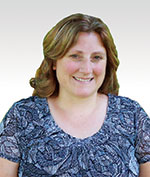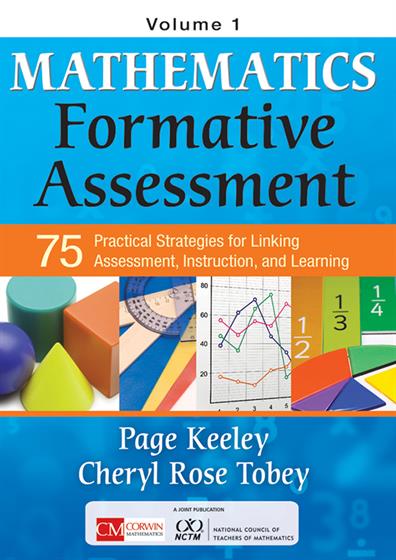
Hands-on, Practical Guidance for Educators
From math,
literacy, equity, multilingual learners, and SEL, to assessment, school counseling,
and education leadership, our books are research-based and authored by experts
on topics most relevant to what educators are facing today.
Mathematics Formative Assessment, Volume 1
Award-winning author Page Keeley and mathematics expert Cheryl Rose Tobey provide 75 formative assessment strategies for informing instructional planning to meet the needs of all students.
- Grade Level: PreK-12, Elementary, Secondary
- ISBN: 9781412968126
- Published By: Corwin
- Series: Corwin Mathematics Series
- Year: 2011
- Page Count: 256
- Publication date: September 15, 2011
Price: $41.95
For Instructors
When you select 'request review copy', you will be redirected to Sage Publishing (our parent site) to process your request.
Description
Transform your mathematics instruction with this rich collection of formative assessment techniques
Award-winning author Page Keeley and mathematics expert Cheryl Rose Tobey apply the successful format of Keeley's best-selling Science Formative Assessment to mathematics. They provide 75 formative assessment strategies and show teachers how to use them to inform instructional planning and better meet the needs of all students. Research shows that formative assessment has the power to significantly improve learning, and its many benefits include:
- Stimulation of metacognitive thinking
- Increased student engagement
- Insights into student thinking
- Development of a discourse community
The authors also provide important guidance with each technique, including usage tips and caveats, implementation examples, and suggested modifications. With practical strategies that are relevant for all grades and topic areas, Mathematics Formative Assessment provides the tools to transform teaching and learning in your classroom.
Author(s)

Page D. Keeley
PAGE KEELEY has been a leader in science education for over 20 years. She "retired" from the Maine Mathematics and Science Alliance (MMSA) in 2012 where she had been the Senior Science Program Director since 1996. Today she works as an independent consultant, speaker, and author providing professional development to school districts and organizations in the areas of formative assessment and teaching for conceptual understanding.
Page has been the principal investigator and project director on 3 National Science Foundation-funded projects including the Northern New England Co-Mentoring Network (NNECN), PRISMS- Phenomena and Representations for Instruction of Science in Middle School, and Curriculum Topic Study- A Systematic Approach to Utilizing National Standards and Cognitive Research. In addition, she developed and directed state MSP projects including Science Content, Conceptual Change, and Collaboration (SC4) and TIES K-12- Teachers Integrating Engineering into Science K-12 and two National Semi-Conductor Foundation grants, Linking Science, Inquiry, and Language Literacy (L-SILL) and Linking Science, Engineering, and Language Literacy (L-SELL). She developed and directed the Maine Governor’s Academy for Science and Mathematics Education Leadership, which completed its fourth cohort group of Maine teacher STEM leaders, and is a replication of the National Academy for Science and Mathematics Education Leadership, of which she is a Fellow.
Page is a prolific author of over twenty national best-selling and award-winning books, including twelve books in the Uncovering Student Ideas in Science series, four books in the first edition Curriculum Topic Study series, and four books in the Science and Mathematics Formative Assessment- Practical Strategies for Linking Assessment, Instruction, and Learning series. Several of her books have received prestigious awards in educational publishing. She has authored numerous journal articles and contributed to several book chapters. She is a frequent invited speaker at regional, national, and international conferences on the topic of formative assessment in science, understanding students’ (and teachers’) thinking, and teaching for conceptual understanding.
Prior to leaving the classroom to work at the Maine Mathematics and Science Alliance in 1996, Page taught middle and high school science for 15 years. At that time she was an active teacher leader at the state and national level, serving two terms as President of the Maine Science Teachers Association and NSTA District II Director 1995-1998 and NSTA Executive Board member (prior to the Board and Council restructuring in 1997). She received the Presidential Award for Excellence in Secondary Science Teaching in 1992 and the Milken National Distinguished Educator Award in 1993.
Since leaving the classroom in 1996, her work in leadership and professional development has been nationally recognized. In 2008 she was elected the 63rd President of the National Science Teachers Association (NSTA), the world's largest organization of K-12, university, and informal science educators. In 2009 she received the National Staff Development Council’s (now Learning Forward) Susan Loucks-Horsley Award for Leadership in Science and Mathematics Professional Development. In 2013 she received the Outstanding Leadership in Science Education award from the National Science Education Leadership Association (NSELA) and in 2018, The Distinguished Service to Science Education Award from NSTA. She has served as an adjunct instructor at the University of Maine, was a Cohort 1 Fellow in the National Academy for Science and Mathematics Education Leadership, was a science literacy leader for the AAAS/Project 2061 Professional Development Program, and served on several national advisory boards. She has a strong interest in global science education and has led science/STEM education delegations to South Africa (2009), China (2010), India (2012), Cuba (2014), Iceland (2017), Panama (2018), and Costa Rica (2019).
Prior to entering the teaching profession, Page was a research assistant for immunogeneticist, Dr. Leonard Shultz, at the Jackson Laboratory of Mammalian Genetics in Bar Harbor, Maine. She received her B.S. in Life Sciences/pre-veterinary studies from the University of New Hampshire and her Masters degree in Science Education from the University of Maine. In her spare time she enjoys travel, reading, photography, fiber art, and dabbles in modernist cooking and culinary art. A Maine resident for almost 40 years, Page and her husband currently reside in Fort Myers, FL and Wickford, RI. Page can be contacted at pagekeeley@gmail.com or through her web site at www.uncoveringstudentideas.org

Cheryl Rose Tobey
Cheryl Rose Tobey is a senior mathematics associate at Education Development Center (EDC) in Massachusetts. She is the project director for Formative Assessment in the Mathematics Classroom: Engaging Teachers and Students (FACETS) and a mathematics specialist for Differentiated Professional Development: Building Mathematics Knowledge for Teaching Struggling Students (DPD); both projects are funded by the National Science Foundation (NSF). She also serves as a director of development for an Institute for Educational Science (IES) project, Eliciting Mathematics Misconceptions (EM2). Her work is primarily in the areas of formative assessment and professional development.
Prior to joining EDC, Tobey was the senior program director for mathematics at the Maine Mathematics and Science Alliance (MMSA), where she served as the co–principal investigator of the mathematics section of the NSF-funded Curriculum Topic Study, and principal investigator and project director of two Title IIa state Mathematics and Science Partnership projects. Prior to working on these projects, Tobey was the co–principal investigator and project director for MMSA’s NSF-funded Local Systemic Change Initiative, Broadening Educational Access to Mathematics in Maine (BEAMM), and she was a fellow in Cohort 4 of the National Academy for Science and Mathematics Education Leadership. She is the coauthor of six published Corwin books, including seven books in the Uncovering Student Thinking series (2007, 2009, 2011, 2013, 2014), two Mathematics Curriculum Topic Study resources (2006, 2012), and Mathematics Formative Assessment: 75 Practical Strategies for Linking Assessment, Instruction and Learning (2011). Before joining MMSA in 2001 to begin working with teachers, Tobey was a high school and middle school mathematics educator for ten years. She received her BS in secondary mathematics education from the University of Maine at Farmington and her MEd from City University in Seattle. She currently lives in Maine with her husband and blended family of five children.
Table of Contents
Preface
Acknowledgments
About the Authors
1. An Introduction to Formative Assessment Classroom Techniques (FACTs)
What Does a Formative Assessment?Centered Classroom Look Like?
Why Use FACTs?
How Does Research Support the Use of FACTs?
Classroom Environments That Support Formative Assessment
Connecting Teaching and Learning
Making the Shift to a Formative Assessment-Centered Classroom
2. Integrating FACTs With Instruction and Learning
Integrating Assessment and Instruction
Assessment That Promotes Thinking and Learning
Linking Assessment, Instruction, and Learning: The Mathematics Assessment, Instruction, and Learning Cycle (MAIL Cycle)
Stages in the MAIL Cycle
Engagement and Readiness
Eliciting Prior Knowledge
Exploration and Discovery
Concept and Skill Development
Concept and Procedure Transfer
Self-Assessment and Reflection
Selecting and Using FACTs to Strengthen the Link Between Assessment, Instruction, and Learning
3. Considerations for Selecting, Implementing and Using Data From FACTs
Selecting FACTs
Selecting FACTs to Match Learning Goals
FACTs and the Common Core Standards for Mathematics
Selecting FACTs to Match Teaching Goals
The Critical Importance of Classroom Context in Selecting FACTs
Planning to Use and Implement FACTs
Starting Off With Small Steps
Maintaining and Extending Implementation
Using Data From the FACTs
4. Get the FACTs! 75 Mathematics Formative Assessment Classroom Techniques (FACTs)
#1. A & D Statements
#2. Agreement Circles
#3. Always, Sometimes, or Never True
#4. Card Sorts
#5. CCC: Collaborative Clued Corrections
#6. Comments-Only Marking
#7. Commit and Toss
#8. Concept Attainment Cards
#9. Concept Card Mapping
#10. Concept Cartoons
#11. Create the Problem
#12. Every Graph Tells a Story
#13. Example, Nonexample
#14. Fact-First Questioning
#15. Feedback to Feed-Forward
#16. Fist to Five
#17. Four Corners
#18. Frayer Model
#19. Friendly Talk Probes
#20. Give Me Five
#21. Hot Seat Questioning
#22. Human Scatter Graph
#23. Is It Fair?
#24. I Used to Think . . . But Now I Know . . .
#25. Justified List
#26. Justified True-or-False Statements
#27. K-W-L Variations
#28. Learning Goals Inventory (LGI)
#29. Look Back
#30. Matching Cards
#31. Mathematician's Ideas Comparison
#32. More A?More B Probes
#33. Muddiest Point
#34. No-Hands Questioning
#35. Odd One Out
#36. Opposing Views Probes
#37. Overgeneralization Probes
#38. Partner Speaks
#39. Pass the Problem
#40. P-E-O Probes (Predict, Explain, Observe)
#41. Peer-to-Peer Focused Feedback
#42. A Picture Tells a Thousand Words
#43. POMS: Point of Most Significance
#44. Popsicle Stick Questioning
#45. PVF: Paired Verbal Fluency
#46. Question Generating
#47. Response Cards
#48. Same A?Same B Probes
#49. Sequencing Cards
#50. Sticky Bars
#51. Strategy Harvest
#52. Strategy Probe
#53. Student Evaluation of Learning Gains
#54. Student Interviews
#55. Terminology Inventory Probe (TIP)
#56. Ten-Two
#57. Thinking Log
#58. Think-Alouds
#59. Think-Pair-Share
#60. Thought Experiments
#61. Three-Minute Pause
#62. 3-2-1
#63. Thumbs Up, Thumbs Down
#64. Traffic Light Cards
#65. Traffic Light Cups
#66. Traffic Light Dots
#67. Two-Minute Paper
#68. Two or Three Before Me
#69. Two Stars and a Wish
#70. Two Thirds Testing
#71. Volleyball, Not Ping-Pong!
#72. Wait Time Variations
#73. What Are You Doing and Why?
#74. Whiteboarding
#75. Word Sort
Appendix: Annotated Resources for Mathematics Formative Assessment
References
Index
Reviews
"This book is a wonderful resource for integrating formative assessment into student-centered instruction. The authors describe numerous ways teachers can access the many levels of student understanding. It belongs on every mathematics teacher’s shelf."
Edward C. Nolan, PreK-12 Mathematics Specialist"This book is a wonderful resource for integrating formative assessment into student-centered instruction. The authors describe numerous ways teachers can access the many levels of student understanding. It belongs on every mathematics teacher’s shelf."
Montgomery County Public Schools, Rockville, MD
"This book contains an incredible set of Math FACTs – Formative Assessment Classroom Techniques. If you have been curious about Formative Assessment or how to implement it in your math classroom, this book provides the tools to get you started."
Lyneille Meza, Coordinator of Data & Assessment"This book contains an incredible set of Math FACTs – Formative Assessment Classroom Techniques. If you have been curious about Formative Assessment or how to implement it in your math classroom, this book provides the tools to get you started."
Denton Independent School District, TX
"This book features formative assessment strategies specifically written for math and can be used in any math class. A book that we have been waiting for."
Zsuzsanna Laughland, Mathematics Teacher"This book features formative assessment strategies specifically written for math and can be used in any math class. A book that we have been waiting for."
Kennett High School, North Conway, NH
"This book is a game-changer! By putting theory into practical digestible units, Mathematics Formative Assessment gives teachers of all levels a bank of techniques to design standards-aligned classes. I wish I had something like this 20 years ago when I was first teaching."
Daniel Kikuji Rubenstein, Executive Director"This book is a game-changer! By putting theory into practical digestible units, Mathematics Formative Assessment gives teachers of all levels a bank of techniques to design standards-aligned classes. I wish I had something like this 20 years ago when I was first teaching."
Brooklyn Prospect Charter School, NY
"Coaches and other teacher leaders will find this compendium of assessment strategies invaluable."NCSM Newsletter, Spring 2012
National Council of Supervisors of Mathematics
"Most important, Keeley and Tobey discuss extensively the use of teh data generated to inform teaching. Coaches and other teacher leaders will find this compendium of assessment strategies invaluable."Kay Gilliland, Editor
NCSM Newsletter
For Instructors
When you select 'request review copy', you will be redirected to Sage Publishing (our parent site) to process your request.

